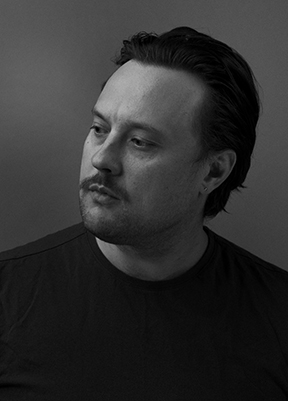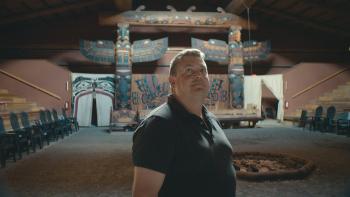Image Caption
Summary
Local Journalism Initiative Reporter
Windspeaker.com
The third season of Farm Crime will stream on CBC Gem Nov. 3, and the first episode, “The Cedar Culprit”, showcases the work of Métis filmmaker and director Conor McNally.
McNally travels into beautiful forests with Guardians from the Wei Wai Kum First Nation in British Columbia as he discovers how timber poaching in their territory has affected the community.
Geoff Morrison, creator and executive producer of Farm Crime, developed the series following a story in Quebec when millions of dollars in Maple syrup was stolen.
“Some people organized and managed to steal $14 million of Maple syrup from the strategic reserve that the Federation of Maple Syrup Farmers in Quebec had stored in a warehouse,” Morrison said. “I just thought this was so incredulous that someone had this idea to steal that much of an agricultural product and that it was worth so much.”
Morrison said he started paying attention to other farm crimes in the news and began researching stories about the impact the crimes had on communities and culture.
Which brought Morrison’s attention to the West Coast and a First Nation with traditional territory near Campbell River on Vancouver Island and across to the mainland.
Wei Wai Kum First Nation had granted harvesting agreements to people outside their community to remove deadfall from the area. One of the businesses began illegally chopping down valuable live cedar trees.
“It’s one thing to go and take deadfall, but then it’s another thing to go and cut outside of the zone you’re allowed to cut in and, on top of that, cut down living trees,” McNally said. Trees, he said, that had a purpose other than to burn.
“There’s a number of issues there which we touch on in the episode,” McNally said. “Certainly, the big one is that they use the cedar to make canoes, for totems, the traditional carvers. It takes years to grow the size of tree that they need to make a lot of the cultural items. It can take hundreds of years to grow. So when somebody goes in and poaches them illegally without the Nation’s consent, then it sets back the opportunity to engage in cultural ceremony.”
Guardians, are community members who are given authority to watch over the territory and guard against poaching and other detrimental activities.
“They don’t have the same kind of enforcement powers that police do,” McNally explained.
“The Cedar Culprit” follows how the First Nation fought for the poacher to receive a larger fine than what was initially given, and how, despite the company getting a fine, the cultural worth of the timber went beyond any monetary value.
“These are irreplaceable cedar,” McNally said.
Morrison said the goal of Farm Crime is to focus on farming and agriculture, but also the atypical type of stories. “Things you wouldn’t hear about in the mainstream news, and also to take a perspective that obviously treats the stories quite seriously.”
The subjects from coast to coast include investigations about lobsters, horses, and baby eels being stolen, and about suspicious canola sales. Each episode focuses on one subject.
Morrison has a team that works on many of the episodes, but when the subject is about an Indigenous community or issue, he wants the director to honour the community traditions authentically, so an Indigenous director is hired to work on the project.
“It’s certainly important to have a (Indigenous) filmmaker involved in telling the story like this for sure,” Morrison said about the Wei Wai Kum incident. “I mean there’s definitely a connection there and so Conor was involved from the beginning in trying to put this story together.”
Morrison and McNally had worked together in the second Farm Crime season about a family who had horses stolen from their property.
“I was really impressed with Conor’s work,” Morrison said. “He’s got a really broad skill set. Like he directs, he shoots, he edits, and I think, honestly, he’s got a really good eye, and I could see kind of this cinematic approach to his short films and mid-length films he made before.”

Based in Edmonton, McNally bypassed formal film training and began creating by relying on his instincts and learning by trial and error. His films have been screened nationally and internationally and include the 40-minute experimental documentary ôtênaw (2017), which focuses on the oral storytelling of educator Dr. Dwayne Donald. That film was followed by IIKAAKIIMAAT (2019), a short documentary focusing on the life and work of Blackfoot and Dene artist, Lauren Crazybull. And there have been many other films.
“I’ve never really thought about cedar forests in that way, like cedar poaching,” said McNally, “so, I definitely jumped at the opportunity to be part of Season 3.”
McNally said he was honoured to learn about West Coast culture by speaking with knowledge keepers and guardians of the trees at Wei Wai Kum First Nation.
“It’s a very, very beautiful special place for a number of reasons,” he said. “Just the wildlife. Like seeing eagles. We saw bears, and we saw a whale. I couldn’t believe all the natural beauty we saw on just one boat ride.”
Windspeaker is owned and operated by the Aboriginal Multi-Media Society of Alberta, an independent, not-for-profit communications organization.
Each year, Windspeaker.com publishes hundreds of free articles focused on Indigenous peoples, their issues and concerns, and the work they are undertaking to build a better future.
If you support objective, mature and balanced coverage of news relevant to Indigenous peoples, please consider supporting our work. Whatever the amount, it helps keep us going.

